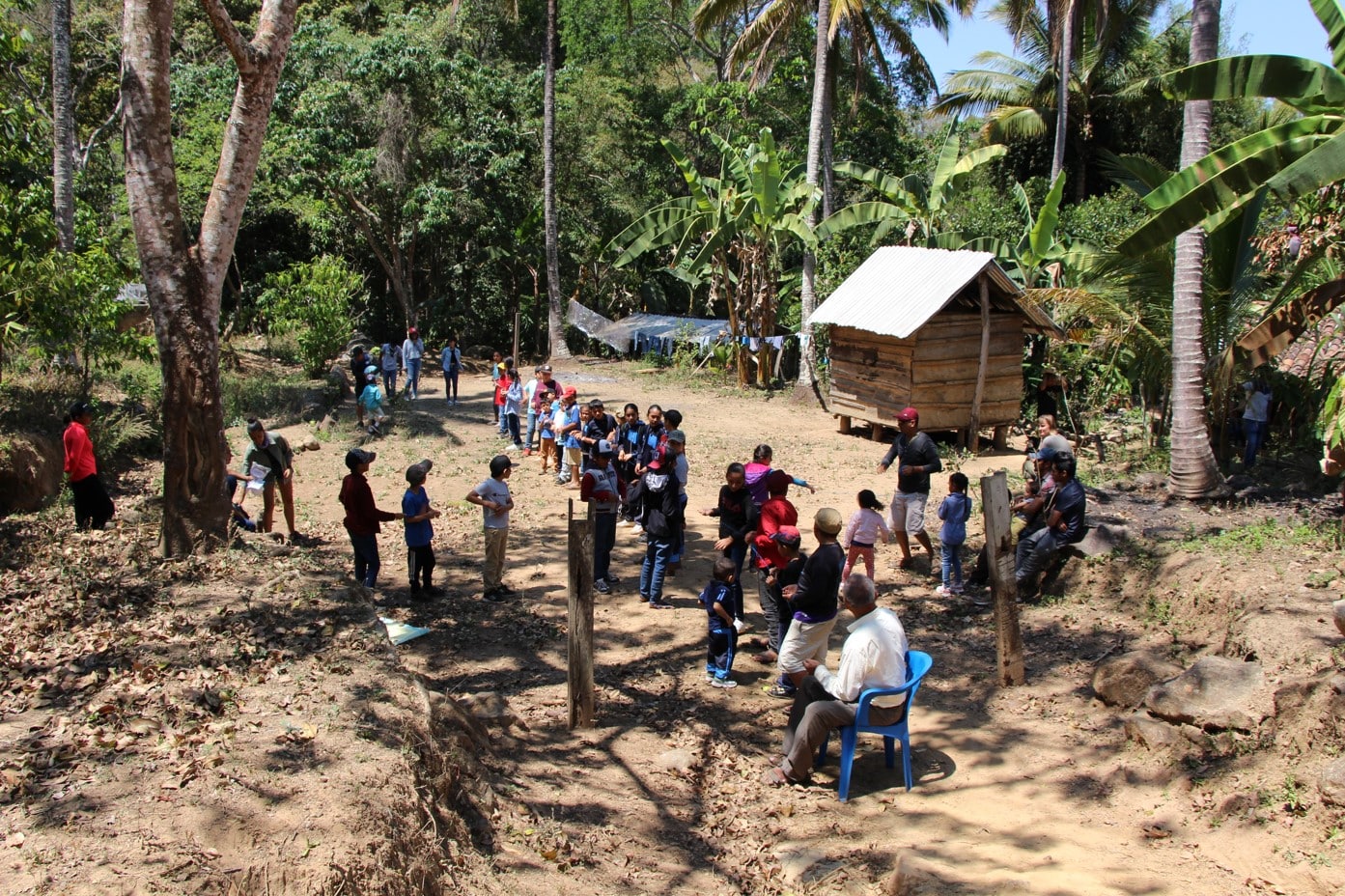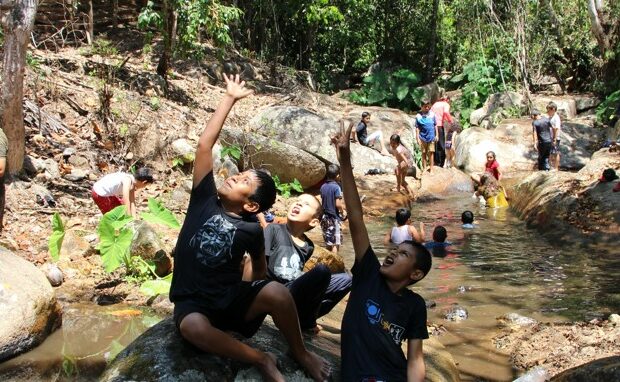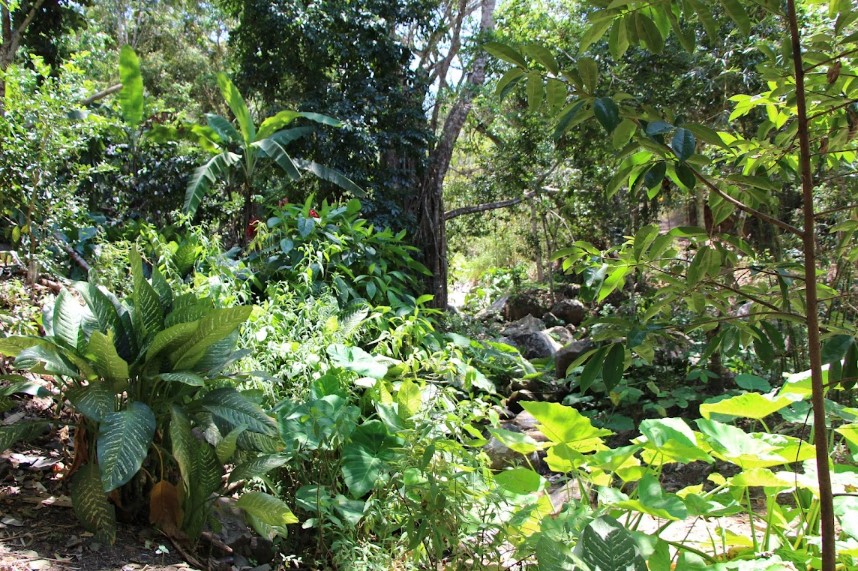By Ximena Rodriguez, ReSiMar Regenerative Education Coordinator.
“How much of our perception of life is influenced by the place we live in?” This is one question on my mind, as well as, “How often do we have the opportunity to understand the relationship between our life and our neighbors?” And, concerning our watershed specifically, “Do the local children understand how the river, and what happens along it, impacts their lives and their communities?” These are the things that Maestro Belén and I constantly ask ourselves especially due to our role as Regenerative Educators in the Juluchuca Watershed. In celebration of Earth Day 2023, Professor Belen and I organized a field trip for 32 children from the 4 communities in the watershed. Don Jesus and his family hosted us all in the mountains at the headwaters on the Gutiérrez farm for a series of fun and educational activities that had the specific aim of teaching the children about the ripple effect of decisions within the watershed and how the four communities of the micro watershed can come together and embrace their place to better protect this delicate ecosystem.
One of the most impactful games we coordinated was simply to get the children to line up and hold a blue piece of string. Don Jesus sat holding the start of the string, as the community elder representing the source of the river and the mountain community he has worked his whole life to protect. We highlighted that in holding the string they were all connected on that spot in the same way that the river connects all of their communities from the mountains all the way down to where it meets the ocean. If one community does not respect the river and the sustenance it provides then the communities below will suffer the consequences.
Don Jesus started the flow, first with a bottle of water and then some fruits so the children were rapidly passing items down to the next person in line, actively mimicking the river’s flow. The child at the end of the string representing the ocean was about to get lucky as a basket worth of fruit was heading her way and then Belen and I questioned the children, “what happens when the fruit reaches the ocean?”, the response “well nothing, it’s organic”… interesting. Then Don Jesus started the flow again but this time with pieces of trash, unsurprisingly the children didn’t want to touch the trash, Belen asked “do you think the river wants to carry the garbage? And what happens when it reaches the ocean, or piles up and blocks the flow upstream?” The immediate realization on their faces was rewarding to see and after a few pieces of trash, the kids at the ‘mountain’ end of the river (string) started refusing to send trash down. They were even more concerned when we mimicked the effects of deforestation and overuse of water by cutting the string and making the group separate. The children from each community may not interact much in their day-to-day lives and each community has its own issues to overcome, however this simple exercise showed them that the decisions they, their parents, and their fellow community members make have a much greater impact on other families than they may have realized.
This field trip was designed as part of a larger effort of immersive community experiences which are important to our wider project to regenerate the watershed.
Giving the gift of knowledge is a beautiful thing, connecting children with elders like Don Jesus is a beautiful thing and inspired children returning home and sharing their learnings with elders in their communities is a truly beautiful thing. So beyond providing development opportunities, we have experienced through this field trip and the resulting social engagement, that the children act as a crucial bridge to drive cultural change within the elders of the community. This, in its simplest form, is the basis of our Regenerative Education curriculum which we have been developing alongside experts from Harvard for the past 3 years. The curriculum, which is tailored to our watershed encourages knowledge sharing, understanding of the history of place and promotes the urgency of recognizing the environmental problems and how the community handles their responsibility when it comes to protecting nature.
Reflecting on the excursion, our Regenerative Education Coordinator Ximena Rodriguez shared, “In reality, what our regenerative education curriculum has taught us is that the children don’t need to listen to lectures, over and over again, about the importance of the river. They need to see it, need to experience it, and most of all, it’s vital for them to share time together to understand the dynamics of their role and of each of their communities. It was beautiful to see the children engaged and asking questions to Don Jesus Gutiérrez and see them learning through games and playtime, but principally, through sharing stories.”
We strongly believe that change is a holistic process and in order to transition the watershed to a more prosperous, regenerative, whole-systems thinking approach, it is necessary to spend more time in the communities, have more presence in the schools and to strengthen the relationship with parents and teachers. Empathy and respect are our best teachers to understand how the four communities of the micro watershed can unify and embrace their territory. Happy Earth Day!






